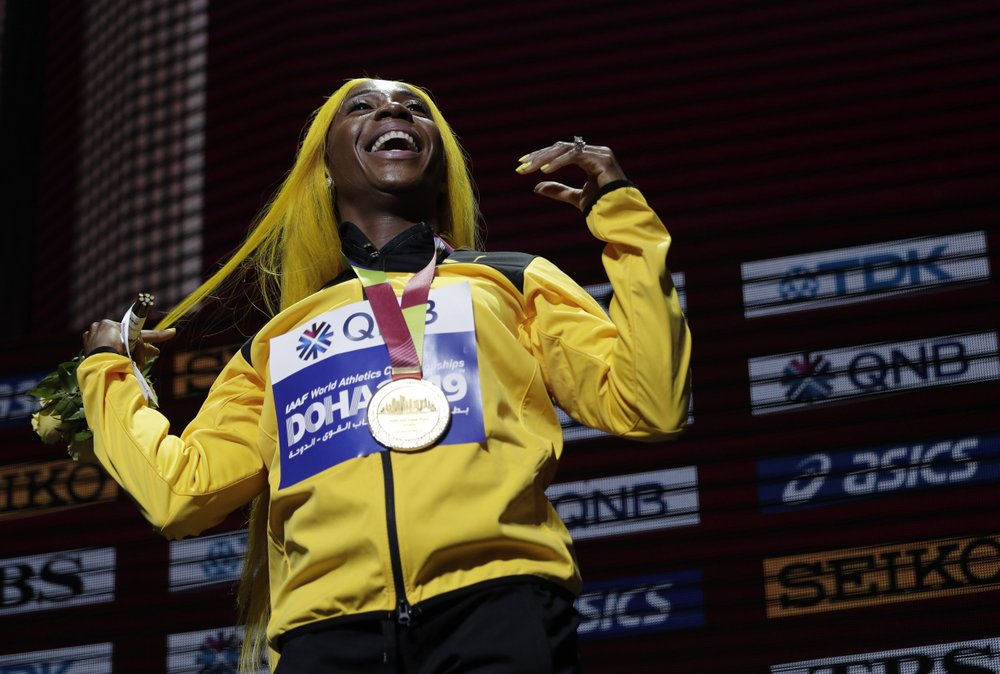Next up, Tokyo: Track leaves Qatar still looking for a star

Shelly-Ann Fraser-Pryce of Jamaica, gold medalist in the women’s 100 meters, reacts during the medal ceremony at the World Athletics Championships in Doha, Qatar, Monday, Sept. 30, 2019. (AP Photo/Nariman El-Mofty)
DOHA, Qatar — If the goal of this year’s track and field world championships was to find a fresh face, a vibrant personality, a one-of-a-kind talent to replace the mile-wide void left by Usain Bolt’s absence, then consider it still a work in progress.
The 10-day run in the desert had its moments — a world record in the 400-meter hurdles, a hometown high jumper taking gold, female sprinters and hurdlers striking a blow for new moms everywhere. But the main message coming out of Doha very well might have been “Wait ’til Next Year.”
Article continues after this advertisementThe Tokyo Olympics, the first that will take place without Bolt since 2000, start in less than 10 months, and the worlds provided some clues as to what’s ahead — and also about the problems this sport still faces.
There were a few athletes with the star power to shine for at least a couple of days, including a pair of double gold medalists: Shelly-Ann Fraser-Pryce, a vibrant new mom from Jamaica who established herself as the woman to beat, again, in the sprints; and Noah Lyles, the American with the silver hair who won the 200 and anchored the U.S. to a long-awaited victory in the 4×100 relay.
There were also problems aplenty for the sport that anchors the Olympic program over the final week of the games.
Article continues after this advertisementDoping reared its head, as usual.
It came in the form of the latest developments in the long-running Russian scandal, leading to the question: Which athletes from the world’s second-biggest delegation will be allowed to compete next year, and under what conditions?
And in the form of 100-meter champion Christian Coleman’s confusing, and ultimately dismissed , whereabouts case.
And then by the sudden removal of Alberto Salazar, the famed distance coach who received a four-year doping ban based on evidence that he ran experiments with supplements and testosterone, all as a way of trying to build a stronger, better runner.
One of Salazar’s protégés, Sifan Hassan, pulled a first-of-its-kind double, winning gold medals in the 1,500 and 10,000 meters.
She came under scrutiny, not only for associating with Salazar but for her romp in the 1,500 meters — a wire-to-wire runaway that makes her the favorite at any distance she tries next year.
“Sadly, it is the world we live in,” IAAF president Sebastian Coe said. “It is inevitable that outstanding performances, given the broader nature of trust, is permanently a question.”
That wasn’t Coe’s only problem.
The debate about the wisdom of bringing the IAAF’s biggest competition to a country that is admittedly still gearing up to host the biggest in any sport — the 2022 World Cup — haunted this event from the get-go.
It put Coe on the defensive about the thin crowds that suddenly — magically? — got much bigger toward the end, as the criticism mounted; and also about the road races run in the middle of the night in stifling conditions that sent dozens of athletes off the course and into the medical tent.
But next year in Tokyo, the weather could be even hotter.
So, consider this a warm-up for the main event.
Coe said that, going into the final day, 28% of medalists in Qatar were aged 24 or under.
“We have some metrics that tell us our sport is in pretty good shape,” he said.
Here’s a look at a few of the up-and-comers about whom Coe speaks:
JAPANESE RELAY MEMBERS
Aug. 7, 2020, will be an electric day inside the Olympic Stadium. Japan has never earned Olympic gold in the men’s 4×100 relay, but the team certainly stoked some enthusiasm when it won a surprise silver in Rio de Janeiro four years ago.
A foursome anchored by Hakim Sani Brown, who runs at the University of Florida, backed that up by setting a national record (37.43 seconds) to capture a bronze medal. Handoffs and teamwork are the key for Japan, which will not beat the United States on speed alone.
MUTAZ BARSHIM
The biggest cheers of the Doha championships were saved for Barshim, the high jumper who was born in Doha and represents Qatar.
“The Qatari Falcon” sent the fans home happy, and will be a favorite in Tokyo. Hard to imagine him savoring a victory more than this one, though.
SALWA EID NASER
The women’s 400 stage belonged to heavy favorite Shaunae Miller-Uibo. But the 21-year-old Naser, born in Nigeria but now running for Bahrain, stole the show with a time of 48.14 seconds. The world record of 47.60 seconds has long been thought untouchable, in part because it was set by an East German in the 1980s. Maybe not now, though.
“Anything is possible,” Naser said.
WOMEN’S 400 HURDLES
Dalilah Muhammad broke her own world record in adding a world title to her Olympic crown. Pushing her in Doha and down the road will be 20-year-old Sydney McLaughlin, who earned the silver in Doha as Muhammad held her off by .07 seconds.
And while Muhammad’s world record currently stands at 52.16 seconds, the talk in this event is that the 52-second barrier could be breakable.
“It is definitely possible,” Muhammad said.
ARMAND DUPLANTIS
The Swedish pole vaulter who lives in Louisiana and went to LSU gave defending world champion Sam Kendricks of the U.S. a run for his money. Kendricks prevailed, but not after a back-and-forth tussle that ended with Duplantis taking silver.
“I am young,” Duplantis said. “I have a lot more opportunities.”